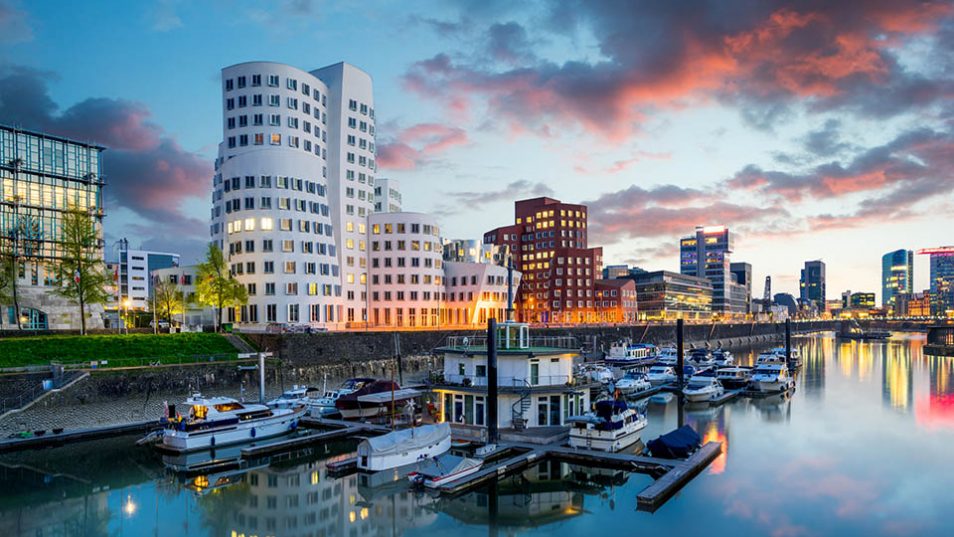Why the German Innovation Powerhouse NRW is Important to Japan
 © DWIH Tokyo/iStock.com/jotily
© DWIH Tokyo/iStock.com/jotily
September 24, 2021
[by Toru Kumagai]
On June 16, 2021, the capital city of North Rhine-Westphalia (NRW) Düsseldorf hosted the NRW-Japan Summit meeting. The event saw participants present various examples of innovations from both Japan and Germany, along with panel discussions among businesspeople.
“NRW is a Driver of Innovation”
On this occasion, Prof. Dr. Andreas Pinkwart, NRW’s Minister of Economic Affairs, Innovation, Digitalisation and Energy, commented that “NRW plays an important role of being a driver of innovation in Germany. To further strengthen our role, we want to build an international network with scientists, researchers, and businesspeople in other countries. By forming strategic cooperative relationships, we will be able to put new ideas into practical use as businesses. In that sense, the ties we have with Japan—a country we have worked together with for many years—are extremely important.”
Felix Neugart, chief executive officer of the state’s trade and investment agency NRW.Global Business, added that “Today, Japanese companies have a strong interest in NRW. Irrespective of the COVID-19 pandemic, in 2020 numerous Japanese companies have opened offices or expanded existing bases of operation in NRW. Given the emphasis that the state’s government has placed on innovation in its economic policy, there’s no question that NRW will become even more important to technology-focused companies in the future.”
Concentration of Universities and Research Institutions Makes it a Hall of Knowledge
Why is NRW so attractive for Japanese as well as other international businesses? NRW is the most populous German state, with an estimated 17.93 million people living here. The state’s gross domestic product (GDP) for 2020 was similarly at the head of the list, at €697 billion (¥90.61 trillion, at an exchange rate of €1 = ¥130).
NRW’s strength comes from its numerous universities and research institutions that have distinguished themselves through innovation. The state is also sometimes spoken of as the “ABC region,” thanks to presence of three particularly eminent German universities: RWTH (A)achen University, the University of (B)onn, and the University of (C)ologne. RWTH Aachen in particular, with around 550 people on faculty and approximately 5,800 researchers, is known as one of Germany’s most distinguished institutions of higher education in the field of technology. It is a Technical University, so of the university’s approximately 47,000 students, 57% study engineering and 23% study either mathematics or the natural sciences. And RWTH Aachen’s graduates can be found for example among the ranks of directors and managers at Germany’s major automobile manufacturers.
One of the unique features about this university are the large number of academic spinnoffs –the numerous instances where researchers have used technologies developed at the university for launching new businesses. Since 1984, around 500 companies have gotten their start from RWTH Aachen. If we also include supplier companies, the spinoffs have created jobs for around 8,000 people. In 2000, the university opened the RWTH Innovation Entrepreneurship Center. In collaboration with the Aachen Chamber of Industry and Commerce, the centre extends a helping hand to researchers and technical experts looking to strike out on their own. These factors make NRW very attractive to foreign companies, and businesses such as Microsoft, Ford, Ericsson, and United (Raytheon) Technologies have established bases of operation in the vicinity of RWTH Aachen and deepened their cooperative ties with the university.
Similarities to Japan’s Innovation Project
The state of NRW is also home to numerous noted research institutions, including Forschungszentrum Jülich, the Fraunhofer Institute for Production Technology (Aachen), the Fraunhofer Institute for Applied Information Technology (Sankt Augustin), the German Aerospace Center (DLR, in Cologne), Max Planck Institutes in Cologne and Bonn (the headquarters are in Munich), and the Helmholtz Association of German Research Centres (Bonn).
According to NRW.Global Business’ Mr. Neugart, start-ups in NRW have focused especially on Industry 4.0, the Internet of Things, smart manufacturing technologies that will digitize the manufacturing industry, automobile electrification and digitization (smart mobility), quantum computing, new materials, green energy, practical implementations of hydrogen energy, and medical technology.
Meanwhile, Japan’s government and its business and scientific communities have been promoting “Society 5.0” – an initiative with a strong focus on digitalization of the economy and society. This project overlaps in many respects with Germany’s Industry 4.0 initiative. The Japanese automobile industry—one of the country’s mainstays—is also currently facing its greatest turning point since the development of the automobile in the 19th century, just like its German counterpart. This turning point is marked by the transition from the internal combustion engine to electric cars and by the development of the software-based connected car.
Japan’s government is also seeking to achieve carbon neutrality for the country by 2050. To achieve the massive reduction in greenhouse gases that is required, there needs to be a switch from the fossil fuels that the steel, chemical, aluminium, and other industries use to green hydrogen that is derived from renewable energy. Japan’s hydrogen technologies rank among the best in the world, and cooperation with similar efforts in Germany could lead to a dramatic progress in the areas of research and development. (For related articles see: “Germany’s New National Hydrogen Strategy” and “German and Japanese Electric Power Industries Embark on the Practical Applications of Hydrogen Energy.”)
Close-Knit Cooperative Ties between Japan and NRW
Incidentally, the history of ties between Japan and NRW is a long one. The Japanese Chamber of Industry and Commerce in Düsseldorf was founded in March 1966. Today, after fifty-five years of operation, the Chamber has 306 full-member Japanese companies that are located in NRW. Also participating in Chamber activities are 231 Japanese and non-Japanese companies located in Munich, Hamburg, Frankfurt, and other regions (all figures current as of January 2021). It is the largest chamber of commerce for Japanese companies in Europe, and it plays a crucial role in mediating with the state of NRW for Japanese companies doing business in Germany. Additionally, NRW.Global Business also has a base of operations in Japan (NRW. Global Business Japan). Of Germany’s 16 federal states, only two—NRW and Bavaria—have such outposts in Japan. This fact speaks to just how important these two states view their relationships with the country.
As one of the wellsprings of innovation in Germany, the state of NRW is certain to remain a place that Japan will want to continue to keep an eye on in the future as well.
To find out more about NRW-Japan business partnerships, visit the website of the NRW.Global Business Japan (NRW Japan K.K.) Trade & Investment Agency of the German State of North Rhine-Westphalia (NRW).
Click here to read other articles from the series “Toru Kumagai’s report on R&D trends in Germany”.

About Toru Kumagai
Born in Tokyo in 1959, Kumagai graduated from the Department of Political Science and Economics at Waseda University in 1982 and joined Japan Broadcasting Corporation (NHK), where he gained a wealth of experience in domestic reporting and overseas assignments. After NHK, he has lived and worked as a journalist in Munich, Germany, since 1990. He has published more than 20 books on Germany and Germany-Japan relations, as well as been to numerous media outlets to report on the situation in Germany.
